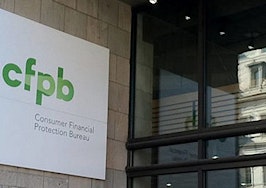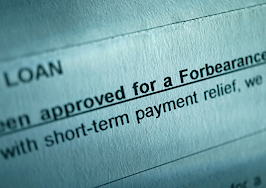“The bureau is unnecessarily inserting confusion.”
That’s the feedback one industry leader had on a new rule being proposed by the Consumer Financial Protection Bureau (CFPB) that would change the rules of the game for mortgage servicers. With its new proposed rule, servicers would have no choice but to prevent foreclosures in 2021.
“The nation has endured more than a year of a deadly pandemic and a punishing economic crisis,” CFPB Acting Director Dave Uejio said. “We must not lose sight of the dangers so many consumers still face. Millions of families are at risk of losing their homes to foreclosure in the coming months, even as the country opens back up.”
The CFPB is still weighing the rule and the effect it would have on the housing industry, including considering certain exceptions to the rule. The CFPB is requesting comments from stakeholders on its proposed rule, but stated that, given the urgency of the crisis, it is requesting comments be submitted before May 11, 2021.
But stakeholders aren’t convinced, calling the rule a bad move and saying it violates trust with the industry.

David Stevens
“The bureau is unnecessarily inserting confusion into a complex market,” David Stevens, Mountain Lake Consulting CEO and former Mortgage Bankers Association CEO, told Inman. “The Consumer Financial Protection Bureau is forcing mortgage servicers to violate their contractual obligations with their investors. Why did we go through all this work during the Great Recession to establish a national servicing standards rule that included all the waterfall obligations? The bureau is violating the trust they established with the industry here — really bad move.”
Evolution of the rules
In January 2014, the CFPB’s official servicing rules took effect, creating a baseline set of standards for all U.S. servicers to follow. The guidelines apply to all mortgage servicers, except for smaller servicing shops that deal with 5,000 or fewer loans.
Some of the changes included forbidding dual-tracking, or from starting a foreclosure if a borrower already submitted a completed application for a loan mod or foreclosure alternative.
To give borrowers time to submit loan-mod applications, the CFPB rule also prevents servicers from making a first foreclosure notice or filing until a mortgage is at least 120 days delinquent. Furthermore, servicers must inform a borrower of all loss mitigation options after the homeowner has missed two consecutive mortgage payments.
The goal was to prevent another foreclosure crisis such as the wave that followed the housing market crash in 2007.
But last year was full of unprecedented events that no one could have been prepared for.
On Jan. 21, 2020, the U.S. confirmed the first case of COVID-19 in the country — a traveler that had returned from Wuhan, China nearly two weeks before. It was shortly after that that the virus was declared a Public Health Emergency of International Concern on Jan. 30, 2020, and later a pandemic on March 11, 2020. Chaos ensued, and the housing market wasn’t excluded.
Job losses mounted in April and the unemployment rate soared to 14.7 percent with 20.5 million people out of work as states began enforcing shutdowns.
Then came the first game changer — the Coronavirus Aid, Relief, and Economic Security Act. With millions of homeowners now unable to make their mortgage payments — or any payment for that matter — Congress passed the CARES Act to ensure mass foreclosures didn’t occur due to government-mandated shutdowns.
The Act mandated that borrowers of government-backed loans such as those backed by Fannie Mae and Freddie Mac could request forbearance for up to 18 months even without having to show proof of hardship, and servicers had to give it to them.
“The earlier forbearance program in the CARES Act applied to borrowers with federally-backed mortgage loan on residential real property,” Spilman Thomas & Battle attorney Nicholas Mooney said in an interview with Inman. “Broadly speaking, that included loans that are insured by the Federal Housing Administration; guaranteed or insured by the Department of Veterans Affairs; made, guaranteed, or insured by the Department of Agriculture, and purchased or securitized by the Federal Home Loan Mortgage Corporation (Freddie Mac) or the Federal National Mortgage Association (Fannie Mae).”

Nicholas Mooney
“Borrowers on those loans were able to obtain up to 360 days of forbearance by requesting it from their servicer and attesting that they have suffered a hardship during the COVID-19 emergency,” Mooney continued. “Those agencies later announced that they were expanding their forbearance programs another six months, making those borrowers eligible for up to 18 months of forbearance.”
This created confusion of its own, and Ginnie Mae had to aid servicers with added liquidity in order to keep them in business as many borrowers stopped making payments, but servicers rose to the challenge.
“Since the beginning of the pandemic, servicers have worked with the CFPB, as well as consumer advocates and counseling organizations, on an awareness campaign to help borrowers in need of forbearance,” MBA President and CEO Bob Broeksmit said.
“We share the same goal: avoiding foreclosure whenever possible. So far, servicers have successfully helped more than 1.4 million borrowers obtain payment relief and sustainable long-term solutions for the difficulties caused by the pandemic. There are still more than 2.5 million homeowners in forbearance who servicers will continue to help as the economy reopens and the unemployment rate declines. Servicers remain committed to ensuring borrowers affected by COVID-19 understand their options and keep their homes whenever that is possible.”
But now that 18-month period is coming to an end and once again, all eyes are on mortgage servicers (including the CFPB’s). And the CFPB is taking matters into its own hands, as it once again changes the rules on mortgage servicers.
Its rule is intended to ensure servicers are allotting enough time to thoroughly review borrowers’ mitigation options, but makes several critical changes.
Most notably, all servicers fall under the CFPB’s proposed rule — not just those backed by the federal government.
“Servicers of private loans have not been subject to foreclosure forbearances being imposed on them, but the CFPB proposed rule would do that,” Mooney said. “Whereas servicers of private loans currently may voluntarily choose to follow the forbearance guidelines applicable to federally backed mortgages, if the proposed rule is enacted, those servicers will go from voluntarily choosing to follow those guidelines to having a mandatory foreclosure forbearance guideline imposed on the servicing of their loans.”
Stevens explained that servicers should already be complying with the mandates laid out in the CARES Act, and that by stepping in, the CFPB is simply making an already complex market even more complex.
“The mortgage servicers should be complying with the GSE’s and the GNMA program requirements, while following the national servicing standards rule and with all CARES act requirements,” he said. “The CFPB should not be overstepping their boundaries here as it simply complicates a complex market.”
It should also be noted that servicers seek to avoid foreclosures whenever possible as they are expensive, time consuming and usually there are better options available for both the servicer and the homeowner.
Staying compliant
In this changing environment, it is important that servicers make sure they remain compliant with all the updates coming down from the Federal Housing Finance Agency, the CFPB, the Federal Housing Administration and other regulators.

Krista Cooley
“Servicers should closely monitor their operations through quality assurance and quality control functions to identify and resolve issues and trends, as well as monitor and resolve complaints, which can also reflect potential trends,” said Krista Cooley, a partner at Mayer Brown and a member of the financial services regulatory and enforcement practice.
“Servicers should document efforts to provide assistance, and actions taken to assist borrowers in obtaining payment assistance, to create a record of compliance with the CFPB servicing requirements. Regular reviews of compliance management systems and policies and procedures to ensure they reflect the most recent guidance is also a good step.”
Mooney agreed that servicers should remain vigilant and said that now is a good time for servicers to audit their procedures
“Many sources warn about a coming flood of foreclosures, loss mitigation and forbearances,” he said. “Servicers would be well-served to take time now to ensure their policies and procedures as well as operations are running correctly and well.”
Cooley pointed out that each of the federal agencies and GSEs that govern or purchase federally backed mortgage loans has set forth detailed requirements for servicers of such loans to contact borrowers, inform them of available payment assistance options, including forbearance and permanent loss mitigation options like deferrals and modifications, and provide those options to borrowers who qualify for such assistance.
“While there are similarities, servicers need to be aware of the differences between the various programs, depending on the type of loan, and cognizant of how those requirements fit within the CFPB servicing regulations,” Cooley said. “The CFPB, federal housing agencies and GSEs have continuously amended and updated guidance throughout the pandemic to account for the unique circumstances resulting from the COVID-19 national emergency, and we expect that they will continue to do so in the coming months. It will be important to stay abreast of those amendments as they are made.”
The legal authority
There have been some that question the CFPB’s legal ability to make such a broad statement as to ban foreclosures for all homeowners for an extended period. But Mooney said the CFPB does, in fact, hold the authority to do what it is proposing.
“Yes, the CFPB has authority under the Real Estate Settlement Procedures Act (RESPA) and also through the Dodd-Frank Act,” he said. “The CFPB has authority to investigate mortgage servicers it believes are not complying with applicable laws or regulations. It also has the authority to commence enforcement actions, which essentially are lawsuits in which the CFPB prosecutes a claim against a mortgage servicer when a violation has occurred and in which it can recover restitution to consumers as well as civil money penalties.”
“The proposed rule recounts the hundreds of thousands of consumers the CFPB is concerned may be subject to foreclosure in the near future,” Mooney added. “Both the recent policy statements and the statements in the proposed rule should indicate to servicers that the CFPB is going to be hyper-vigilant in looking at how servicers are dealing with forbearances in the coming months. If a servicer is not complying with the applicable laws or regulations, it should expect the CFPB will take action.”
Weighing in
But not everyone is upset with the CFPB’s newly proposed rule. Wells Fargo, one of the largest lenders and servicers in the U.S., said it supported the proposal.
“Wells Fargo supports the CFPB’s latest proposals to help homeowners avoid foreclosure as we emerge from the COVID-19 crisis and we look forward to reviewing and commenting on the specific proposed rules,” the bank said in a statement to Inman.
“We are committed to working with the CFPB and other government agencies, the mortgage industry, community leaders, mortgage investors/guarantors and others in determining how to best serve our customers and communities, particularly racially and ethnically diverse communities that have been disproportionately impacted by the pandemic.”
The bureau is actively seeking public comment and is even strongly considering different exemptions to the rule.
“Servicers also should get involved in the rule-making process,” Mooney said. “The new CFPB rule contains a comment period that runs through May 10, 2021. Servicers should familiarize themselves with the proposed rule and make their voice heard by submitting comments.”












